Second in a two-part series
A challenge to people of all faiths -- particularly at a time of growing religious tension between Islamic societies in the Middle East and predominantly Christian societies of the West -- is to be civil and loving toward people of different religions, while still being true to their personal religious convictions.
As discussed last week (see "Personal Contact Affects Teen Views of Muslims" in Related Items), American teenagers have limited knowledge of, and somewhat mixed opinions about, Muslims and Islamic beliefs. It may be useful to consider whether U.S. teens' opinions about Muslims are affected by their own religious beliefs and practices. As part of the August 2003 Gallup Youth survey*, Gallup asked teens (aged 13 to 17) how often they attend church or synagogue. Regular churchgoers are defined as those who attended church in the seven days prior to being interviewed. The survey indicates that 43% of teens fall into this category.
Survey respondents were given a list of six general statements about Muslims and asked whether they agree or disagree with each. Teens who had attended church in the last seven days and those who hadn't expressed similar views on several statements, while their views varied significantly on others. For example, approximately two-thirds of both groups (67% of churchgoers, 65% of non-churchgoers) agreed with the statement, "Most Muslims around the world want peace." Roughly similar percentages felt that, "Most Muslims around the world are accepting of people of other races" (50% of churchgoers and 44% of non-churchgoers).
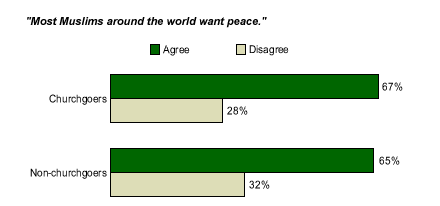
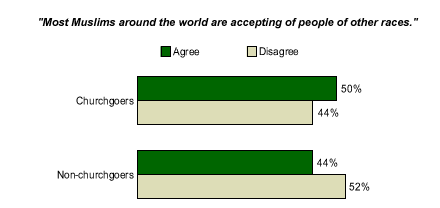
Only about a quarter of each group (21% for churchgoers, 24% for non-churchgoers) agreed that "Most Muslims around the world believe that women and men should have equal rights."
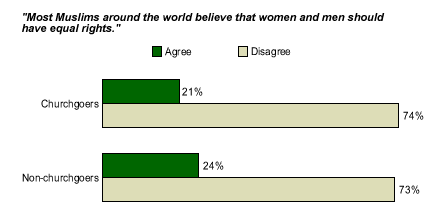
With regard to the other three statements measured in the survey, agreement among churchgoing and non-churchgoing teens differed more substantially. On the statement, "Most Muslims around the world are accepting of homosexuals," only 8% of churchgoers agreed, as did 20% of non-churchgoers.
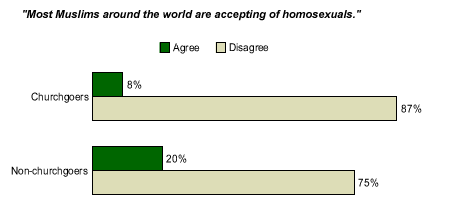
When it came to statements related directly to faith matters, the views of teens who had attended church recently and those who hadn't also differed sharply. Forty percent of the latter group agreed that, "Most Muslims around the world are accepting of other religions," compared to only 27% of teens who had attended church in the past seven days. Similarly, 34% of non-churchgoers felt that, "Christians' and Muslims' religious beliefs are basically the same," while 22% of churchgoers agreed.
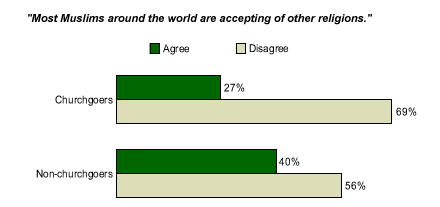
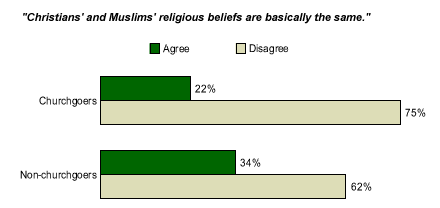
Bottom Line
When it comes to matters related specifically to religion (including homosexuality, which some people view as a religious issue), churchgoing and non-churchgoing teens tend to have differing points of view about Muslims. On other moral issues that are less clearly tied to religion, teens who attend church and those who don't are in general agreement, regardless of whether their attitudes are positive or negative.
*The Gallup Youth Survey is conducted via an Internet methodology provided by Knowledge Networks, using an online research panel that is designed to be representative of the entire U.S. population. The current questionnaire was completed by 517 respondents, aged 13 to 17, between Aug. 1 and Aug. 29, 2003. For results based on the total sample, one can say with 95% confidence that the maximum margin of sampling error is ±5 percentage points.
For results based on the sample of 234 teens who attended church in the past seven days, the maximum margin of sampling error is ±7 percentage points.
For results based on the sample of 280 teens who did not attend church in the past seven days, the maximum margin of sampling error is ±6 percentage points.
